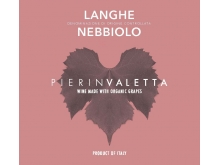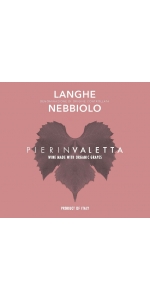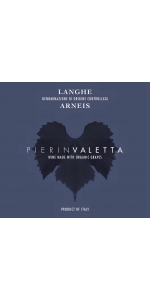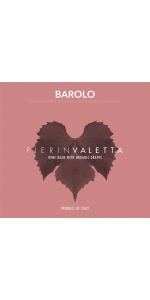Pierinvaletta Nebbiolo Langhe Hills 2018
| Country: | Italy |
| Region: | Piemonte |
| Winery: | Pierinvaletta |
| Grape Type: | Arneis |
| Organic: | Yes |
| Vintage: | 2018 |
| Bottle Size: | 750 ml |
Produced with Nebbiolo grapes from one of the highest plots in the area, at over 500 meters above sea level.
This is an elegant Nebbiolo - fresh and fruity with simple tannins (thanks to the white calcareous soil) and good minerality.
No oak. Aged on the lees for 4 months in Stainless Steel Tan
Fresh, fruity, mineral.
Pierin Valetta is one of the ancestor of the Family and these wines are dedicated to him as we would like to thank him for giving us vineyards that reach up to 70 years old.
Made from 20 years old vines planted on Limestone soils.
No Oak. The wine was aged on the lees for 4 months in Stainless Steel Tanks.
Wine was slightly filtered before bottling.
Produced with Nebbiolo grapes from one of the highest plots in the area, at over 500 meters above sea level.
This is an elegant Nebbiolo - fresh and fruity with simple tannins (thanks to the white calcareous soil) and good minerality.
No oak. Aged on the lees for 4 months in Stainless Steel Tan
Fresh, fruity, mineral.
Pierin Valetta is one of the ancestor of the Family and these wines are dedicated to him as we would like to thank him for giving us vineyards that reach up to 70 years old.
Made from 20 years old vines planted on Limestone soils.
No Oak. The wine was aged on the lees for 4 months in Stainless Steel Tanks.
Wine was slightly filtered before bottling.
Pierinvaletta Arneis Langhe Hills is made from 100% Arneis
No oak. Aged on the lees for 4 months in Stainless Steel Tan
Fresh, fruity, mineral.
Pierin Valetta is one of the ancestor of the Family and these wines are dedicated to him as we would like to thank him for giving us vineyards that reach up to 70 years old.
Made from 20 years old vines planted on Limestone soils.
No Oak. The wine was aged on the lees for 4 months in Stainless Steel Tanks.
Wine was slightly filtered before bottling.
Pierinvaletta Arneis Langhe Hills is made from 100% Arneis
No oak. Aged on the lees for 4 months in Stainless Steel Tan
Fresh, fruity, mineral.
Pierin Valetta is one of the ancestor of the Family and these wines are dedicated to him as we would like to thank him for giving us vineyards that reach up to 70 years old.
Made from 20 years old vines planted on Limestone soils.
No Oak. The wine was aged on the lees for 4 months in Stainless Steel Tanks.
Wine was slightly filtered before bottling.
Pierinvaletta Arneis Langhe Hills is made from 100% Arneis
No oak. Aged on the lees for 4 months in Stainless Steel Tan
Fresh, fruity, mineral.
Pierin Valetta is one of the ancestor of the Family and these wines are dedicated to him as we would like to thank him for giving us vineyards that reach up to 70 years old.
Made from 20 years old vines planted on Limestone soils.
No Oak. The wine was aged on the lees for 4 months in Stainless Steel Tanks.
Wine was slightly filtered before bottling.
Pierinvaletta Organic Barolo Langhe is made from 100 percent Nebbiolo .
Elegant with a good structure and a long pleasant finish.
No filtration before bottling.Wine was aged in Oak foudre for 24 months.
Average 40 years (oldest vines are 70 years old)
Pair with meat, steak.
Produced with Nebbiolo grapes from one of the highest plots in the area, at over 500 meters above sea level.
This is an elegant Nebbiolo - fresh and fruity with simple tannins (thanks to the white calcareous soil) and good minerality.
No oak. Aged on the lees for 4 months in Stainless Steel Tan
Fresh, fruity, mineral.
Pierin Valetta is one of the ancestor of the Family and these wines are dedicated to him as we would like to thank him for giving us vineyards that reach up to 70 years old.
Made from 20 years old vines planted on Limestone soils.
No Oak. The wine was aged on the lees for 4 months in Stainless Steel Tanks.
Wine was slightly filtered before bottling.
Pierin Valetta was one of the anchestor of the family. Valetta was the nickname of the branch of Pierin's family. He was born in 1910 and he believed in his territory since when he was a kid. In fact, thanksfully to him, now the family can grow vineyards which are 70+ years old. Now is the fifth generation which is carry on the winery. Three brothers that are following all the works with the help of their parent
The winery is working with organic practice in Europe and they are in the process of getting their certification.
OLD VINES
The vineyards are 35-75 years old with limited yield per hectare to maximize the grape quality, the terroir and production area.
NO HERBICIDES, SOIL MANAGEMENT
Herb mowing is done manually to avoid any herbicide, sowing of 20+ different variety of herbs that help plants avoiding stress and acting as natural fertilizer in addition to “humus”.
NO PESTICIDES, INSECTS MANAGEMENT
Use of “sexual confusion” (natural method that provide the use of pheromones to avoid the reproduction of the insects without any chemical product) and hand harvest of “noctue” (worms that eat buds in spring, destroying part of the production).
HARVEST
Manual harvest of only the best fruits at the moment of the top maturity followed by an accurate selection to avoid any compromise.
NATURAL FERMENTATION WITH INDIGENOUS YEASTS
Natural starter (pie de cuve) using only yeasts that are naturally present on the skins of the berries, in order to obtain not standard wines, but products that really reflect the territory and production area bottling: cambiare sulphates con sulphates.
BOTTLING WITH THE MAXIMUM RESPECT OF THE WINE
Minimum use of sulphates and clarify only when really necessary. Red wines, generally, are bottled without any filtration in order to don’t lose any feature of the grape.
Lambrusco Amabile Bruscus San Valentino Red is 100% Lambrusco from grapes grown in the province of Modena and Reggio Emilia.
Traditional vinification methods combined with modern technology to produce wines of guaranteed quality. After the grapes are pressed, they are transferred to fermentation tanks where the must is racked off in an average of 70 hours. The wine then completes its first rapid fermentation process and passes to the slower fermentation phase, during which time it is racked off several times to improve its clarity. The wine is placed in an autoclave at strictly controlled temperatures wherein it undergoes a second fermentation. This is known as the Charmat Method. The temperature is controlled for full development of the bouquet and for the lively and natural sparkle so characteristic of this wine.
Deep ruby red with violet reflections and a fine perlage.
Intense vinous bouquet with hints of ripe red fruits.
Lively, fresh, sweet and inviting with bright fruit and a delightful sparkle.
Excellent by itself or with desserts of dark chocolate, gorgonzola, cheesecakes.
- back
Sokol Blosser Big Tree Block Pinot Noir is made from 100 percent Pinot Noir.
1970 was winding down when our founders, Bill Blosser and Susan Sokol Blosser pulled their ’68 VW Camper up to an abandoned prune orchard some 30 miles southwest of Portland. These moonstruck kids had little farming experience and just a basic knowledge of winemaking. What they did have, in abundance, was a passion for growing the Pinot Noir grape and creating world-class wine. Soon after settling on this extraordinary land, they planted their first vines and cinched their place as pioneers in Oregon’s budding wine industry.
Review:
A very impressive wine for the striking sense of spice, white-pepper and briary, forest notes, across red cherries. The palate has sapid, focused style with such taut yet silky tannins holding long and true. Pure red cherries here. Drink or hold.
-James Suckling 94 Points
Each year, Sea Smoke's goal for Southing is to create the ideal marriage of complexity and elegance. The ever-changing nose of the Southing exhibits fresh currant, slight strawberry and rose aromas with notes of dried fruit, fennel, clove and nutmeg. The fine tannins and minerality are enhanced by the estate vineyard's characteristic cool climate acidity.






-150x300.jpg)



